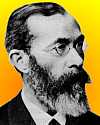 (source)
(source)
|
Wilhelm Wundt
(16 Aug 1832 - 31 Aug 1920)
German psychologist and physiologist who established the first laboratory for experimental psychology.
|
Wilhelm Wundt Quotes on Physiology (6 quotes)
>> Click for 40 Science Quotes by Wilhelm Wundt
>> Click for Wilhelm Wundt Quotes on | Mind | Psychology |
>> Click for 40 Science Quotes by Wilhelm Wundt
>> Click for Wilhelm Wundt Quotes on | Mind | Psychology |
Physiology and psychology cover, between them, the field of vital phenomena; they deal with the facts of life at large, and in particular with the facts of human life.
— Wilhelm Wundt
Physiology is concerned with all those phenomena of life that present them selves to us in sense perception as bodily processes, and accordingly form part of that total environment which we name the external world.
— Wilhelm Wundt
Physiology seeks to derive the processes in our own nervous system from general physical forces, without considering whether these processes are or are not accompanied by processes of consciousness.
— Wilhelm Wundt
Physiology, in its analysis of the physiological functions of the sense organs, must use the results of subjective observation of sensations; and psychology, in its turn, needs to know the physiological aspects of sensory function, in order rightly to appreciate the psychological.
— Wilhelm Wundt
Psychological introspection goes hand in hand with the methods of experimental physiology. If one wants to put the main emphasis on the characteristic of the method, our science, experimental psychology, is to be distinguished from the ordinary mental philosophy [Seelenlehre], based purely on introspection.
— Wilhelm Wundt
In Grundzüge der physiologischen Psychologie [Principles of Physiological Psychology] (1874), 2-3. Trans. K. Damiger, Constructing the Subject: Historical Origins of Psychological Research (1990), 206.
The task of physiological psychology remains the same in the analysis of ideas that it was in the investigation of sensations: to act as mediator between the neighbouring sciences of physiology and psychology.
— Wilhelm Wundt
See also:
- 16 Aug - short biography, births, deaths and events on date of Wundt's birth.
- Wilhelm Wundt in History: The Making of a Scientific Psychology, by David K. Robinson. - book suggestion.
 In science it often happens that scientists say, 'You know that's a really good argument; my position is mistaken,' and then they would actually change their minds and you never hear that old view from them again. They really do it. It doesn't happen as often as it should, because scientists are human and change is sometimes painful. But it happens every day. I cannot recall the last time something like that happened in politics or religion.
(1987) --
In science it often happens that scientists say, 'You know that's a really good argument; my position is mistaken,' and then they would actually change their minds and you never hear that old view from them again. They really do it. It doesn't happen as often as it should, because scientists are human and change is sometimes painful. But it happens every day. I cannot recall the last time something like that happened in politics or religion.
(1987) -- 


